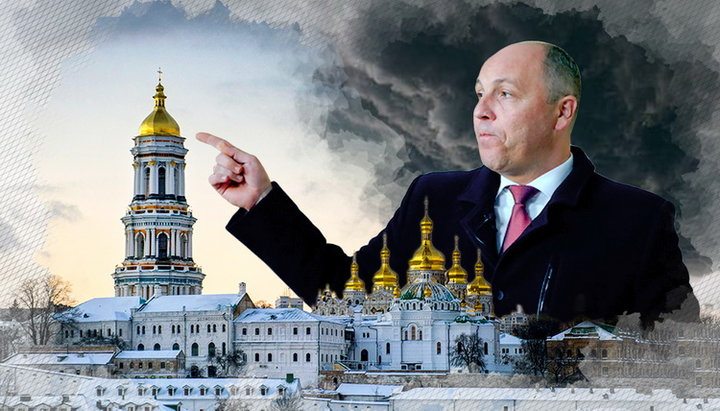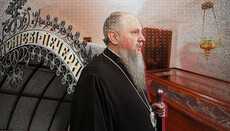Authorities won’t persecute UOC, only rename it and grab its temples

What the Church and believers can expect if the Verkhovna Rada passes bill No. 5309.
The so-called “Unification Council”, at which the UOC KP and the UAOC united into the Orthodox Church of Ukraine (OCU), is followed by a sharply increased activity on legislative pressure on the Ukrainian Orthodox Church. On Thursday, December 20, the Verkhovna Rada may adopt a law on renaming the UOC. This was announced by Speaker Andrei Parubiy during the conciliation council on December 17. What does the relevant bill contain; why does the UOC disagree; and what could be next?
Successors and impostors
Bill No. 5309 was submitted to the Verkhovna Rada more than two years ago, on October 26, 2016. And on July 12, 2017, the Rada Committee on Culture and Spirituality considered and approved it. A year ago, it was even put on the agenda of the next session of the Verkhovna Rada, but was not considered.
The full title of the document is the Law of Ukraine "On Amendments to the Law of Ukraine ‘On Freedom of Conscience and Religious Organizations’ regarding the name of religious organizations (associations) that are part of the structure a religious organization (association), whose governing center is outside Ukraine, in a state that, according to the Law of Ukraine, is recognized to be carrying out military aggression against Ukraine and / or temporarily occupied part of the territory of Ukraine.”
This florid name hides a very simple meaning: to rename the Ukrainian Orthodox Church into the Russian Orthodox Church in Ukraine. There is also a small annex to the bill: to forbid clerics of the UOC to pastor the military, but we will not consider it now.
The logic of the people who have now intensified the campaign for legislative pressure on the UOC is quite simple.
Firstly, since the ideologically correct and state-backed Orthodox Church of Ukraine was established on December 15, then another religious organization with a similar name cannot exist next to it.
Secondly, since the UOC enters into communion with world Orthodoxy through the Russian Orthodox Church, it should be called the Russian Orthodox Church in Ukraine.
Moreover, some politicians who are especially hostile to the UOC want to rename it not even into the Russian but RF Church in order to emphasize that this is the Church of another state.
Politicians disposed hostile to the UOC want to impose the idea that this is the Church of another state.
The names of the Ukrainian Orthodox Church and the Orthodox Church of Ukraine are really similar, but not identical. From a legal point of view, they may well coexist in the Single State Register of Legal Entities. But it's not that. The fact is that, in addition to the name, they also want to take away from the UOC its property and, most importantly, a religious worldview.
A few weeks ago, the representative for the Phanar at the World Council of Churches, Archbishop Job (Getcha) of Telmessos, said in an interview with the BBC that the new church structure in Ukraine would be called the “Orthodox Church in Ukraine”. Moreover, he clarified: “Not the ‘Ukrainian Orthodox Church’, because the Church is one, it belongs to Christ and not to any nation or state.”
In this particular matter, Archbishop Job is right. Indeed, the Church of Christ is one throughout the world, and it would be more correct from an ecclesiological point of view to call it the Orthodox Church in Ukraine (Russia, Poland, Bulgaria, etc.) rather than the Ukrainian (Russian, Polish, Bulgarian, etc.) Orthodox Church, although the latter version of the name is more used in different countries.
But in this case we are not talking about the theological accuracy of wordings, but about much more down-to-earth things. They want to take away th actual, legal name from the Ukrainian Orthodox Church in order to officially announce or at least convince people through the media that it is the OCU that is the legal successor of the Ukrainian Orthodox Church, from which the and UOC KP and UAOC once broke away.
Who is a dissenter?
In 1992, the former head of the UOC Filaret Denisenko did not obey the decisions of the Kharkov Bishops' Council and did not recognize his removal from the leadership position in the UOC. However, being unable to resist the rest of the episcopate, he managed to register a parallel organization – the UOC KP – and tried to declare it the legal successor of all the church property of the UOC, its monasteries, educational institutions, etc. But then it was possible only partially: they managed to grab only the Vladimir Cathedral in Kiev, the residence of the Metropolitan at 36 Pushkinskaya Street and funds in the UOC’s bank accounts (according to some sources, 3 billion Soviet rubles, which equaled $ 4.5 billion dollars at the then exchange rate).
Since not a single monastery, not a single religious educational institution, as well as the absolute majority of parishes, wanted to join the UOC KP, the entire existing organizational structure of the Kiev Patriarchate was created anew. To lead new eparchies, they ordained new “bishops”, new “monks” were made for new monasteries, and new “priests” who received education in new educational institutions were appointed for new parishes.
We emphasize, no matter how much one would like, but it is a fact that the UOC KP is a religious organization that begins its history in 1992. The UOC has remained with the episcopate, monasteries, parishes, seminaries and academies. This is the Church whose history in our land began in 988 with the Baptism of Rus’ by the Holy Equal-to-the-Apostles Prince Vladimir.
However, both in 1992 and today, Filaret Denisenko tries to convince everyone that in 1992 he did not break away from the UOC, but the UOC broke away from him. And now the political situation makes it possible to declare the OCU as the successor of that Church in Ukraine which has existed for 1030 years. But for this, it is necessary to take the name from the true successor – the UOC.
The first step has already been taken: the OCU has appeared. The next step is to take away the name from the UOC, to deprive it of its legal and natural name. And if this works out, the door will be opened for large-scale grabbing of UOC property, at least that which is owned by the state and which the Church owns by the right of use. And this is the complex of monastic buildings, historical temple buildings, and a lot more. The fact that this property was for the most part handed over in ruined form and now has been restored at the expense of believers does not interest anyone.
Thus, one of the main consequences of the renaming of the UOC will be an attempt at the legislative level to declare OCU as the legal successor of the Russian Church from 988, and the Kiev Metropolis from 1458, and the Ukrainian Exarchate from 1921, and the Ukrainian Orthodox Church since 1990, all the property that was transferred to the UOC in its time may be declared the OCU’s.
Not the “Russian world” but the world of Christ
But the main thing is not property, the main thing is people. What is the danger if the UOC will become the Russian Orthodox Church in Ukraine? Unfortunately, even in the UOC itself there are those who do not understand the harmfulness of such a renaming. This is not only assert-grabbing but also a change of consciousness.
Archbishop Job (Getcha), for good reason, remarked that names like Ukrainian, Russian, Bulgarian, etc. Orthodox Church sounds like ethnophyletism. This is when a nation comes first in the mind of a person, and then the Church is placed behind it. If in the case of the Ukrainian (Russian, Bulgarian, etc.) Orthodox Church, this can be argued, the name of the Russian Orthodox Church in Ukraine is certainly fully imbued with ethnophyletism.
The fact is that the Church has always accepted the political and cultural reality in which She lived in this or that historical period, as well as in this or that country. She accepted it, but did not associate Herself with it. Empires, states, and even ethnic groups can disappear and appear, and the Church will exist forever. The Church has lived under emperors, princes, leaders, parliaments and presidents. The consciousness of the Church looks towards eternity. The Church swore allegiance to Christ, not the Byzantine or Russian Empire, independent Ukraine or Poland. She did not swear to any people – neither Greek, nor Russian, nor Ukrainian. For the Church, political, ethnic and any other issues are secondary, for Her the main thing is Christ.
Therefore, in those centuries when the people of our country called themselves Russian, and the Church on this land was called Russian. When people began to call themselves Ukrainians, there were no obstacles for the Church to call itself Ukrainian. If in the future the Verkhovna Rada renames Ukraine, say, into Euro-Ukraine, the Church will accept this name as well since it has been the Church of Christ and it will remain so.
And now, from this point of view, we will look at the name of the Russian (and even more so RF) Church in Ukraine. Here, the emphasis will be placed not on the fact that it is of Christ, but on the fact that it is Russian. To accept this will mean that politicians have forced us to answer the question: who you are with – Russia or Ukraine? At the same time, the question of choosing between the UOC and the OCU is completely different: are you with the Church of Christ or with schism? It is Christ who unites people in the UOC, and not the unanimity of political, national or other views. This is what the politicians want to deprive us of by taking the name.
UOC believers may relate differently to Russia: someone sympathizes with it, for someone else it is an aggressor state. But the main thing for all of us is Christ. Love for God is above all national differences and enmity. Agreeing that we are not the Church of Christ in Ukraine, but the Russian Orthodox Church in Ukraine, we will not only give up the succession of the Church, beginning with Prince Vladimir, and accept asset-grabbing. We will agree that in our consciousness it will not be Christ who dominates but some Russianness, the “Russian world” if you like, whatever good or bad it is.
Do not be afraid!
Let’s conclude. The authorities, forcing the UOC to rename itself into the Russian Orthodox Church in Ukraine, pursue two objectives: first, to take away its property transferred to the Church for use from the state, and secondly, to force the UOC believers to associate themselves primarily with Russia, and secondly with Christ. Therefore, the Church in no case should agree to this and by all legal means should defend its legitimate name – the Ukrainian Orthodox Church. It is necessary to convince, prove, and file lawsuits. We are the Church of Christ, not of a nation. This is necessary to say and prove to everyone and first of all – to ourselves.
Everyone understands the reason why they have now stepped up the process of adopting anti-church bills. All attempts to persuade the UOC or threaten it to join the newly established Church failed. Now they try to do it by legalized violence. Christ taught his disciples how to respond to all the threats of the world: “Do not be afraid!” The church cannot be destroyed. "I will create my Church, and the gates of hell will not prevail against it" (Matt. 16, 18). And whether we will be able to remain faithful to this Church depends on us.











